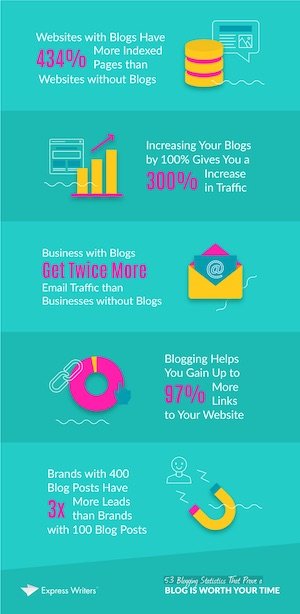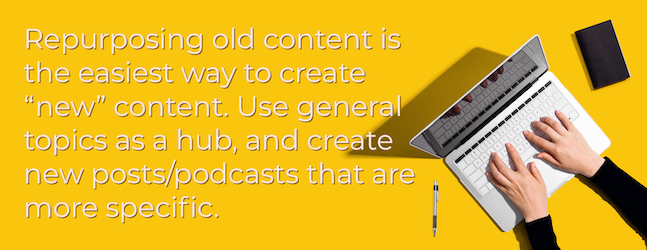Ideas for Creating Content for Blogs and Podcasts
“People are hungry for information. If you don’t provide it, they’ll find it somewhere else.”
On November 19, 2021, I did a podcast called “How to Create Content for Your Blog or Podcast.” There’s a transcript at that link that you can download. I’m creating this blog post in addition to that podcast since there are people who don’t listen to podcasts. And, while you can read the transcript of the podcast, the transcript reads like a narrative—as in, it’s in pure paragraph form, no bullet points. This post has easier-to-read lists and bullet points. So, I thought it would be worth putting this content in both podcast form and in blog form.
Also, this is a topic that lots of people struggle with, including myself. Blogs and podcasts are long-term commitments. When you decide to do one, you probably come up with a dozen ideas at once. “Great! A year of content,” you may be thinking! Nope, that’s 12 weeks of content you just came up with.
To maximize audience engagement and search engine optimization, you need to blog or podcast every week. Once or twice a month a month isn’t enough. (Okay, it’s better than nothing. But it’s not enough to reach your goals.)
And what if you decide to do both a blog and a podcast like I do? Then coming up with weekly content may feel even more daunting. That’s twice the content. Or is it? Keep reading to find out. (You’ve already gotten a hint from the first two paragraphs!)
WHY SHOULD YOU START A BLOG OR A PODCAST?
On November 8, 2021, I wrote a blog post called “Should You Start a Podcast?” In it I discuss some podcasting statistics and how podcasting is good for your business. You can read it for deeper information specifically on podcasting. Let’s look at a couple of statistics on both podcasting and blogging, in case you’re wondering if you should even bother podcasting or blogging.
According to blogging statistics, 60% of Internet users are regularly reading blogs. And, as of 2020, 57% of people are regularly listening to podcasts. There’s a clear market for readers and listeners. I know that when I’m searching for information or help, I usually get it from people’s blogs.
So, there’s an audience for your blog or podcast. People are hungry for information. If you don’t provide it, they’ll find it somewhere else.
How can blogging and podcasting help your business?
First, blogs are great for improving your SEO ranking. This happens in a few ways.
(1) The more content you create, the more opportunities you have to show up in search engines. Simply put, you’ll have more pages for search engines to find. If you’ve got a five-page website, there are only five hits that search engines will get. But if you’ve got 52 blog posts or podcast posts, plus a five-page website, that’s 57 hits that search engines will get. Now, as your blog or podcast grows, search engines will have even more opportunities to find you. Pretty awesome.
(2) Another way that blogs and podcasts help improve your SEO ranking is through internal linking. This is when you refer people to other posts like I’ve done here. So far, I’ve referred you to my podcast about creating content for your blog or podcast and to my blog post about why you should start a podcast. The key is to make sure that your internal links are relevant to the post in which you are sharing them—like here.
(3) In addition to improving your SEO ranking, another reason to start a blog or podcast it to grow your audience. As I mentioned above, the more content you create, the better your SEO. The better your SEO, the greater the chance new people will find you, and the more your audience will grow.
Of course you’ll also want to share all of your posts and podcasts to your social media accounts. Those social posts are easy for people to re-tweet and re-share on Facebook. You can even share on Instagram, even though those posts won’t link back to your website. Create a unique-to-Instagram link for your bio, that contains the basics, such as Home, Blog, Podcast, and Services (no images). Also, be sure to have social-sharing buttons on your website to make it easier for your audience to share without having to copy and paste the link from the browser bar.
So, now that I’ve convinced you that having a blog is good for your business,…
HOW DO YOU COME UP WITH CONTENT IDEAS?
If you’re a service provider, you’ve probably got lots of ideas already—even if you’re not conscious of it!
Think about the kinds of questions clients ask you regularly.
What’s on your FAQ page?
What problems are most often helping your clients with?
What are the most common solutions you come up with?
What’s in your signature program? You can take bits and pieces from you signature program and write about those.
I know! You may be thinking that if you write or podcast about those bits then no one will end up hiring you. Not true. You won’t be sharing everything at once. You won’t be tagging those posts with the name of your signature program, making it easy for visitors to create their own free program. And people will always have more questions.
Most visitors to your website aren’t going to hire you anyway. They’re just checking you out or getting free info. And that’s okay. You need to attract them in order to attract the right people, you ideal clients, who will hire you. Those people will read your stuff and know that you’ve got more for them. And they’ll want to get more directly from you personally, straight to them, in a customized format. Your blog or your podcast will be giving them a taste of you so that they’ll have an idea of what it’s like to work with you directly. That way, it will be easier for them to make the decision to hire you.
You can write personal stories about yourself.
People love blog posts that are relatable. Now, you don’t want your business blog or podcast to be overrun with personal stories. You want the bulk of the posts and podcasts to be informational and educational. People are looking for practical information that can help them do something or help them make a decision. But, when they’re working with or following a sole proprietor, they love getting those behind-the-scenes personal stories, too.
Ask clients or even friends what they’d like to read or hear about.
Find out if they’ve searched for something that’s been hard to find or if there is a particular topic they’re interested in reading about.
Have some ideas that you think are “overdone”?
You know what? They haven’t been covered by you. Those topics need your unique voice and your unique perspective. There are people who will resonate with your view on that topic when they haven’t resonated with anyone else’s before. So, don’t hold back when you think that enough has already been said about that topic. It hasn’t been said by your.
If you sell products, of course you’ll write about your those.
Write about their features, their benefits, what people love about them. Also write about special deals and sales.
What is your competition writing about?
Look at people who have been blogging a while, and scroll way back to see some of their topics. Don’t copy them. Never knowingly use their titles. Absolutely don’t use their same words. And do not use random images you find online without permission. That’s copyright infringement, and you can be sued or at least be sent a cease-and-desist letter with a demand for compensation. I’ve seen it happen.
Repurpose old content
Here’s the answer to the hint I mentioned above. If you have both a blog and a podcast, you can blog and podcast about the same topics—just like I’m doing here. Some people prefer to read, while others prefer to listen. (I prefer to read.) Even if you’re doing just one or the other, you can still reuse old content. For example, I have an entire series on podcasting. I started with “Should You Start a Podcast.” Then I created subsequent blog posts and podcasts about starting a podcast in Squarespace and Apple Podcasts (video), creating content for your podcast, and best practices for running a podcast. Once you create a general blog post or podcast on a topic, it’s easy to create subsequent posts/podcasts on more specific issues around that topic.
Content ideas are all around. Be ready for ideas to hit you any time. Use your phone’s voice recorder or notepad to jot down random ideas. Constantly take notes, even if you end up not using them. But don’t erase them! You might return to them one day! I’ve made that mistake before.
One last thing, it’s really helpful to organize your ideas and your scheduled and published posts/podcasts into a content calendar. There are lots of free templates online. You can also pay for a service, such as Hootsuite or Loomly (my two favorites), that also allow you to share your posts automatically to your social media accounts. I’m currently using my own spreadsheet and posting by hand while I’m regrowing my business. I’ll write about that and share a content calendar in a future post.
I hope this helps! Content creation can be really fun. I certainly enjoy it! Try not to let it overwhelm you. Remember that you’re creating in order to provide useful information for your audience. You know things that they don’t know. And they’ll be grateful to have that information from you.
Start and Grow Your Podcast
Join the Women Podcasters Academy with a course on starting a podcast, a supportive community, and live weekly sessions with me and guest expert podcasters.







